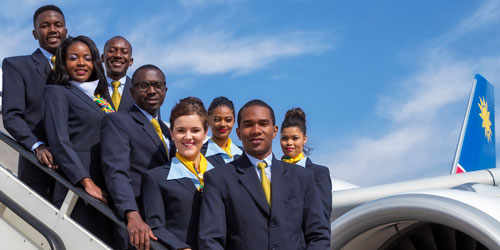
The skies unsung heroes celebrate their special day

Air Namibia on Wednesday joined the world to celebrate the international cabin crew day, which recognises flight attendants’ value contribution and raise awareness about the profession.
Air Namibia, Spokesman, Twaku Kayofa said for many years the profession has struggled to get the recognition it deserves and is often compared to being a ‘sky bound’ waiter/waitress.
Basil Williams, Manager of Cabin Crew at Air Namibia explained that the duties of flight attendants are far broader than anyone would imagine.
“The primary duty of a flight attendant is to ensure safety and comfort of passengers during a flight. They provide the utmost customer service whilst ensuring that passengers’ needs are attended to throughout the journey,” Williams said.
Cabin Crew Controller at Air Namibia, Laurencia Endjala, said that their responsibilities go beyond that of a waitress; serving food is just a small part of our duties she says. “We attend safety briefings with the pilots, ensuring that boarding and disembarking of all passengers goes smoothly.”
Assisting when passengers have special needs to ensure their safety and comfort makes up most of the cabins crews primary concern, Laurencia explained.
She added that flight attendants go through an intensive three months training, to enable them to deal with any emergency situations and customer service relations on-board.
According to her training includes but is not limited to Aviation Medicine, where cabin crew members are able to assist in medical emergencies such as assisting in the birth of a passenger’s child, resuscitate a passenger with cardiac or respiratory problems.
Meanwhile, the national airline, Air Namibia, is rated as a three star airline, and as such, the airline complies with international standards as set down by International Air Transport Association (IATA) and IATA Operational Safety Audit.
The standards stipulate that cabin crew members should pass the initial and recurrent training with a pass rate of over 90%, that subsequently qualifies them to enter the training that empowers them to handle any on-board security and safety related matters.













































